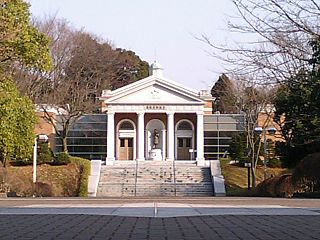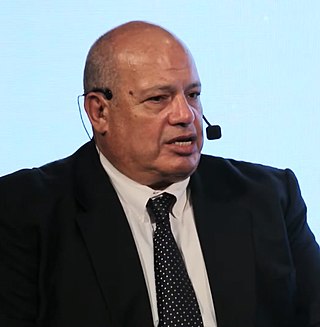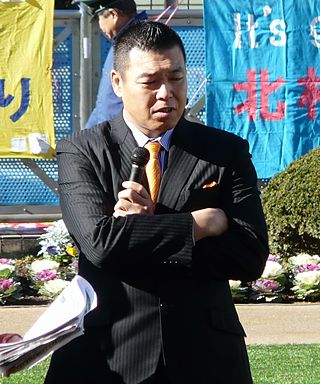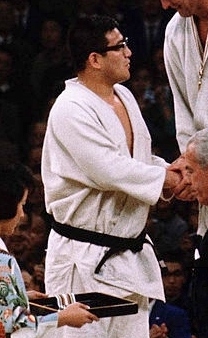
Takushoku University is a private university in Tokyo, Japan. It was founded in 1900 by Prince Taro Katsura (1848–1913). It has two campuses: the main campus in the Bunkyō Ward and a satellite campus in Hachiōji. Takushoku University has five faculties: Commerce, Political Science and Economics, Foreign Languages, International Studies, and Engineering.

The Judo competition at the 1984 Summer Olympics continued the seven weight classes first used at the 1980 Games. With the open division, there were eight competitions. Powerhouse Japan returned to the top of the medal count after eight years, having boycotted the Moscow games. Because of the Soviet-led boycott of the Los Angeles games, several traditionally strong judo countries, including Cuba and the Soviet Union, did not participate. The Judo competition was held at California State University, Los Angeles.

Mohamed Ali Rashwan is an Egyptian judoka. At the 1984 Summer Olympics he won the silver medal in the men's Open Class category.

Naoya Ogawa is a Japanese world champion judoka, retired professional wrestler, and mixed martial artist. He won a total of seven medals at the All-Japan Judo Championships, and set a record of seven medals at the World Judo Championships. Ogawa won the silver medal in the +95 kg judo weight class at the 1992 Summer Olympics.

Tadahiro Nomura is a retired Japanese judoka. He is the only judoka in the world who has won three individual Olympic gold medals in a row, all in the extra lightweight (–60 kg) division.

David Donald Hubert Roger Douillet is a French politician and retired judoka.

Yasuhiro Yamashita is a Japanese judoka. He currently works as an instructor or advisor for numerous organizations, including Tokai University, the International Judo Federation, and the All Japan Judo Federation. He retired from competitive judo on 17 June 1985 after a remarkable career where he won five gold medals in international competitions and marked 203 consecutive victories until his retirement where he went undefeated his entire career against non-Japanese wrestlers. He received the Japanese National Prize of Honor on 9 October 1984. He is considered by many to be the greatest judoka ever.
Yasuyuki Muneta is a Japanese judoka. He won two gold medals and a silver medal at the World Judo Championships.

Shinji Hosokawa is a Japanese retired judoka who won two Olympic medals during the 1980s.

Hitoshi Saito was a Japanese judoka who won two consecutive gold medals at the Olympic games.

Teddy Pierre-Marie Riner is a French heavyweight judoka. An eleven-time world champion in the heavyweight (+100 kg) division, two-time openweight world champion and one-time world champion with the French men's team, he is the first and only judoka in history to win twelve gold medals at the World Judo Championships. Having won the gold medal in the Men's +100 kg event at the Summer Olympics three times and, as a member of the French team, in the mixed team event twice. Additionally, he is a two-time Olympic bronze medalist, a five-time European champion, a four-time World Masters gold medalist and eleven-time Grand Slam winner in his weight category.

The All-Japan judo championships is a judo tournament held every year in Japan. The men's tournament is held in Nippon Budokan on 29 April and the women's tournament is held in Yokohama Cultural Gymnasium in April. The Kodokan and All Japan Judo Federation sponsor the championship.

Isao Inokuma was a Japanese judoka. He won a gold medal in the heavyweight division at the 1964 Summer Olympics in Tokyo and a world title in 1965.
Kazuhiro Ninomiya is a retired judoka who competed in the 1976 Summer Olympics.

Akio Kaminaga was a Japanese judoka who won a silver medal in the open weight category at the 1964 Summer Olympics.
Mayumi Yamashita is a Japanese judoka.
The men's open category competition in judo at the 1984 Summer Olympics in Los Angeles was held on 11 August at the California State University. The gold medal was won by Yasuhiro Yamashita of Japan.
The Japan men's national artistic gymnastics team is a sport group governed by Japan Gymnastics Association and represents Japan in international gymnastics competitions and multi-sports events. Followed the establishment of All Japan Gymnastics Federation in 1930, the team first appeared at the 1932 Summer Olympics and gradually became the major force till this day. For nearly two decades, from 1960 to 1978, Japanese men was dominant and won every gold medal at the Olympics and World Championships.












